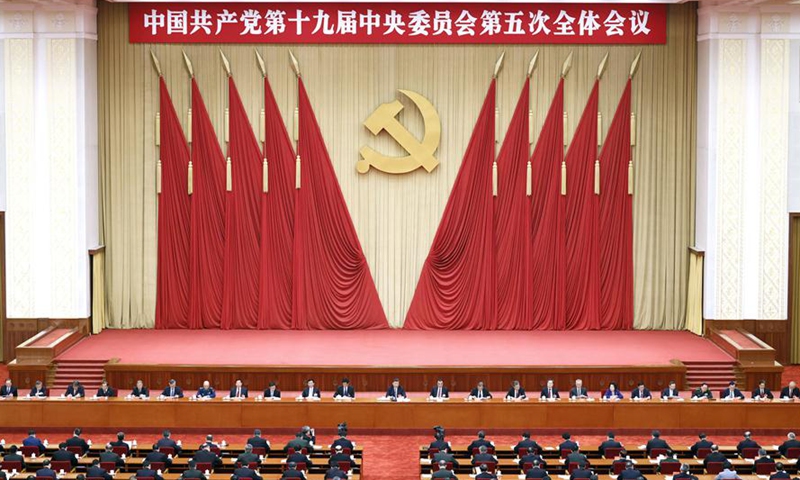Foreign firms confident in new roles in China’s 14th Five-Year Plan
Source: Global Times Published: 2020/11/13 3:43:45

The fifth plenary session of the 19th Central Committee of the Communist Party of China (CPC) is held in Beijing, capital of China, from Oct 26 to 29, 2020.Photo:Xinhua
Representatives from foreign businesses said China’s new “double development dynamic” gives them confidence for their operations in China at a background briefing on the Fifth Plenary Session of the 19th Central Committee of the Communist Party of China (CPC) on Thursday.
Chinese officials and economists introduced on Thursday the country’s 14th Five-Year Plan (2021-25) and long-range goals through the year 2035 to representatives from foreign companies in China, explaining the opportunities in the huge Chinese market, which is expected to become the world’s largest consumer market by the end of this year.
China would like to embark on a track of shared growth with the world, Hu Zhaoming, an official with the International Department of the CPC Central Committee, told a host of some 200 representatives from foreign businesses, international institutions and foreign trade organizations on Thursday, noting that the dual-circulation development model does not mean a closed door.
The meeting was held after the conclusion of the fifth plenary session, which adopted the CPC Central Committee’s proposals for the formulation of the 14th Five-Year Plan (2021-25) for National Economic and Social Development and the Long-Range Objectives Through the Year 2035.
China will strive to make new strides in economic development during the period, and aim to realize sustained and sound economic development on the basis of a marked improvement in quality and efficiency, according to a communique released after the session.
Zhang Yansheng, chief research fellow with the China Center for International Economic Exchanges and host speaker at the briefing, said that to meet the consumption demand of the Chinese people, China will continue to open up to the world and will welcome multinational companies to play a key role.
While China will significantly increase its imports from world countries, it will also see the domestic market as the mainstay and will be thinking more about its security, in terms of food, energy and the supply chain, Zhang said.
Zhang noted that higher-quality growth will be the prevailing theme in the next phase of development toward 2035, featuring scientific innovation, a marked increase in research & development, rules-based governance, a narrowing income gap between rural and urban areas and an environmentally friendly approach to development.
Alan Beebe, president of AmCham China, told reporters on Thursday that he expects more opportunities to arise in the fields of public health, climate change and environmental protection in the next few years for American companies doing business in China.
Novikov Dmitrii, an official with the Russia-China Cultural and Business Center, said China-Russia cooperation is moving forward smoothly, with key projects in airplanes, helicopters and the setting up of an international exchange market leading the way.
Tomoki Fujihara, director of the economic information department with the Japan External Trade Organization, said Japanese firms are particularly interested in issues such as the implementation of China’s foreign investment law, and how China plans to build itself into an innovative manufacturing power.
It is a good opportunity to look at China’s vision for the next five years, Pierre Mirochnikoff, told the Global Times. He noted that there are many areas in which Chinese and French companies could engage in cooperation.
Liu Yunfeng, executive vice president of Volkswagen Group China, said the Chinese government emphasis on the interaction of domestic circulation and external circulation in the dual-circulation development model has given the company confidence.
Cong Yi, a professor at the Tianjin University of Finance and Economics, told the Global Times that China’s status as the world’s only growing major economy in 2020 and a super-sized market means the country will be a magnet for foreign companies in the years to come.
Given the current international situation of trade protectionism, unilateralism and the lingering pandemic, foreign companies that are actively involved in China’s drive toward innovation and China’s innovation system are expected to do well while those who shut themselves off from China to protect their leading technologies will put themselves in a disadvantageous position as China’s super-sized market will give birth to alternatives.